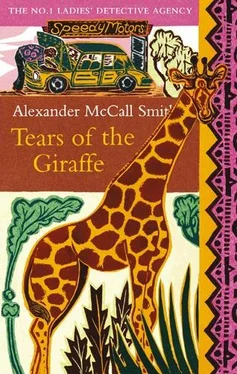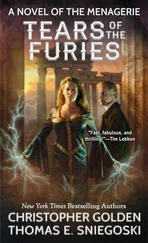"Your children are down there, Mma?" asked Mma Ramotswe politely.
'Yes," came the reply. "They are staying with their grandmother. I work in a shop in Gaborone, New Deal Furnishers. You know them maybe?"
Mma Ramotswe nodded, as much for the confirmation of her judgement as in answer to the question.
"I have no husband," she went on. "He went to Francistown and he died of burps."
Mma Ramotswe gave a start. "Burps'? You can die of burps?"
'Yes. He was burping very badly up in Francistown and they took him to the hospital. They gave him an operation and they found that there was something very bad inside him. This thing made him burp. Then he died."
There was a silence. Then Mma Ramotswe spoke. "I am very sorry."
"Thank you. I was very sad when this happened, as he was a very good man and he had been a good father to my children. But my mother was still strong, and she said that she would look after them. I could get a job in Gaborone, because I have my form two certificate. I went to the furniture shop and they were very pleased with my work. I am now one of the top salesladies and they have even booked me to go on a sales training course in Mafikeng."
Mma Ramotswe smiled. "You have done very well. It is not easy for women. Men expect us to do all the work and then they take the best jobs. It is not easy to be a successful lady."
"But I can tell that you are successful," said the woman. "I can tell that you are a business lady. I can tell that you are doing well."
Mma Ramotswe thought for a moment. She prided herself on her ability to sum people up, but she wondered whether this was not something that many women had, as part of the intuitive gift.
"You tell me what I do," she said. "Could you guess what my job is?"
The woman turned in her seat and looked Mma Ramotswe up and down.
"You are a detective, I think," she said. "You are a person who looks into other people's business."
The tiny white van swerved momentarily. Mma Ramotswe was shocked that this woman had guessed. Her intuitive powers must be even better than mine, she thought.
"How did you know that? What did I do to give you this information?"
The other woman shifted her gaze. "It was simple," she said. "I have seen you sitting outside your detective agency drinking tea with your secretary. She is that lady with very big glasses. The two of you sit there in the shade sometimes and I have been walking past on the other side of the road. That is how I knew."
They travelled in comfortable companionship, talking about their daily lives. She was called Mma Tsbago, and she told Mma Ramotswe about her work in the furniture shop. The manager was a kind man, she said, who did not work his staff too hard and who was always honest with his customers. She had been offered a job by another firm, at a higher wage, but had refused it. Her manager found out and had rewarded her loyalty with a promotion.
Then there were her children. They were a girl of ten and a boy of eight. They were doing well at school and she hoped that she might be able to bring them to Gaborone for their secondary education. She had heard the Gaborone Government Secondary School was very good and she hoped that she might be able to get a place for them there. She had also heard that there were scholarships to even better schools, and perhaps they might have a chance of one of those.
Mma Ramotswe told her that she was engaged to be married, and she pointed to the diamond on her finger. Mma Tsbago admired it and asked who the fiance was. It was a good thing to marry a mechanic, she said, as she had heard that they made the best husbands. You should try to marry a policeman, a mechanic or a minister of religion, she said, and you should never marry a politician, a barman, or a taxi driver. These people always caused a great deal of trouble for their wives.
"And you shouldn't marry a trumpeter," added Mma Ramotswe. "I made that mistake. I married a bad man called Note Mokoti. He played the trumpet."
"I'm sure that they are not good people to marry," said Mma Tsbago. "I shall add them to my list."
THEY MADE slow progress on the last part of the journey. The road, which was untarred, was pitted with large and dangerous potholes, and at several points they were obliged to edge dangerously out into the sandy verge to avoid a particularly large hole. This was perilous, as the tiny white van could easily become stuck in the sand if they were not careful and they might have to wait hours for rescue. Rut at last they arrived at Mma Tsbago's village, which was the village closest to the farm that Mma Ramotswe was seeking.
She had asked Mma Tsbago about the settlement, and had been provided with some information. She remembered the project, although she had not known the people involved in it. She recalled that there had been a white man and a woman from South Africa, and one or two other foreigners. A number of the people from the village had worked there, and people had thought that great things would come of it, but it had eventually fizzled out. She had not been surprised at that. Things fizzled out; you could not hope to change Africa. People lost interest, or they went back to their traditional way of doing things, or they simply gave up because it was all too much effort. And then Africa had a way of coming back and simply covering everything up again.
"Is there somebody in the village who can take me out there?" asked Mma Ramotswe.
Mma Tsbago thought for a moment.
"There are still some people who worked out there," she said. "There is a friend of my uncle. He had a job out there for a while. We can go to his place and you can ask him."
THEY WENT first to Mma Tsbago's house. It was a traditional Botswana house, made out of ochre mud bricks and surrounded by a low wall, a lomotana, which created a tiny yard in front of and alongside the house. Outside this wall there were two thatched grain bins, on raised legs, and a chicken house. At the back, made out of tin and leaning dangerously, was the privy, with an old plank door and a rope with which the door could be tied shut. The children ran out immediately, and embraced their mother, before waiting shyly to be introduced to the stranger. Then, from the dark interior of the house, there emerged the grandmother, wearing a threadbare white dress and grinning toothlessly.
Mma Tsbago left her bag in the house and explained that she would return within an hour. Mma Ramotswe gave sweets to the children, which they received with both palms upturned, thanking her gravely in the correct Setswana manner. These were children who would understand the old ways, thought Mma Ramotswe, approvingly-unlike some of the children in Gaborone.
They left the house and drove through the village in the white van. It was a typical Botswana village, a sprawling collection of one- or two-room houses, each in its own yard, each with a motley collection of thorn trees surrounding it. The houses were linked by paths, which wandered this way and that, skirting fields and crop patches. Cattle moved about listlessly, cropping at the occasional patch of brown, withered grass, while a pot-bellied herd-boy, dusty and be-aproned, watched them from under a tree. The cattle were unmarked, but everybody would know their owner, and their lineage. These were the signs of wealth, the embodied result of somebody's labours in the diamond mine at Jwaneng or the beef-canning factory at Lobatse.
Mma Tsbago directed her to a house on the edge of the village. It was a well-kept place, slightly larger than its immediate neighbours, and had been painted in the style of the traditional Botswana house, in reds and browns and with a bold, diamond pattern etched out in white. The yard was well-swept, which suggested that the woman of the house, who would also have painted it, was conscientious with her reed broom. Houses, and their decoration, were the responsibility of the woman, and this woman had evidently had the old skills passed down to her.
Читать дальше









